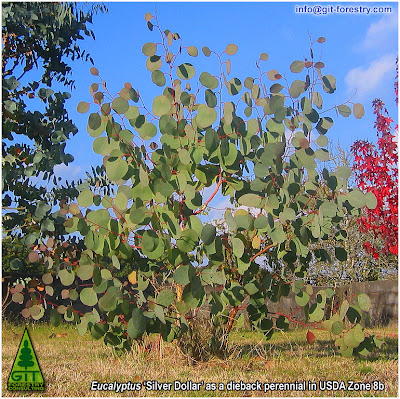Eucalyptus in the Fridge (2008-2009)
Or predictions for frost damage impact on cold hardy Eucalyptus in Northwestern Spain, based on yearly observation of patterns of climate and tree growth
GIT Forestry Consulting - Consultoría y Servicios de Ingeniería Agroforestal - www.git-forestry.com - EUCALYPTOLOGICS
Year 2008 left with frown ups for cold hardy Eucalyptus growers in the Northern Hemisphere. For Eastern USA growers (South Carolina to New York), November brought heavy early freezing causing considerable damage but also species trials being culled by Captain Winter. December was also critical for growers in Northwestern USA (Oregon & Washington) and in Canada (British Columbia & Vancouver Island) due to heavy snowfalls and week-long frost & ice storms at sea level, putting to test ornamental plantings in many gardens.
But 2009 has started also quite wintery for frost tolerant eucalypt growers in Central and Northern Europe, since they received the visit of Siberian cold blasts brought by Eastern winds during early January, with absolute minima plummeting to levels unheard of since mid 1980's (-20ºC in Germany, -18ºC in the Netherlands & Belgium, -15ºC in France).

Fig. 1 - Prediction of frost & ice damage to cold hardy Eucalyptus nitens following December 2008 Frosty Week in the highlands of Galicia (Click image to enlarge)
For Northwestern Spain, things have been relatively mild by late 2008. Excepting the worst snowfall in 15 years covering the highest hills, our cold hardy Eucalyptus in Galicia have not endured the effects of the Siberian cold wave of January 2009. However they have suffered one year more the effects of an almost classical "Christmas Frosty Week".
Seven consecutive frost & ice events put the eucalypt plantations of inland Galicia (mainly Eucalyptus nitens cultivated forests at 500-800 meter elevation) to yet another good cold hardiness test, especially when grown at frost pockets, as in the pictured case. After years of observation of weather patterns during the worst of winter and its impact on over two dozen of Eucalyptus species on trial, there it goes our prediction (Fig. 1) for frost damage impact after the December 2008 events.

Fig. 2 - 2008 assessment of frost & ice damage to Eucalyptus nitens following December 2007 Frosty Week in the highlands of Galicia (Click image to enlarge)
As a reminder, this "Frosty Week" was milder than the previous one in December 2007 (Fig. 2). That winter, more near the climatic average for our USDA Hardiness Zone 8b, brought interesting results on cold hardiness for several of the Index Species (E. globulus for EUCF Zone, E. nitens for ATL1 Zone and E. gunnii for ATL2 Zone) in our conditions, and also interesting results for other eucalypt species to compare to each of the index species due to their theoretical similarity in tolerance to frost.
Suggestion of Key Climatic Parameters to Assess Eucalyptus Cold Hardiness
- Absolute minimum air temperature (minima minimorum) during the most restrictive event of a given winter: Allows to refine the "non plus ultra" temperatures for successful cultivation of a given species.
- Tendency of daily minimum air temperatures for the longest span of consecutive frost events, or previous and following days to one-night singular frost events: Allows a look at a broader range of events and their potential interaction. As example, you can compare to the dew point to work out when the frost point is reached, so when your eucalypts go from the fridge to the freezer.
- Longest time span under zero (0ºC / 32ºF): Allows the identification of frosting and defrosting patterns, or trees going in and out of the freezer, even if just some hours per day. And helps to work out what is the "non plus ultra" time in the freezer for your eucalypts.
- Tendency of daily maximum air temperatures for the longest span of consecutive frost events, or previous and following days to one-night singular frost events: Allows the identification of radiational frost events and changes in temperature gradients along tree height, which can be dependant on insolation. If available for several heights adapted to crop height, then you kick ass.
- Tendency of soil temperatures for the longest span of consecutive frost events, or previous and following days to one-night singular frost events. Allows to track the extent of "near-permafrost", if any, and its damage to root systems (which affects Eucalyptus resurrection!).
Keeping track of all this is not that easy, as you surely need some hi tech weather measuring equipment. But not all of this is necessary everywhere. However a sound base weather station to which correlate field measurements or data collected from temporary outlier weather sensors can save you some headaches. For amenity growers, absolute minima and maximum lenght of under zero periods are the minimum quantitative information to try to track and keep records of!
You can't grow Eucalyptus there...
Because it snows. Or because winters are frosty. So yes. Don't try. It is impossible.

(Click image to enlarge)
Also at EUCALYPTOLOGICS...
 Snow Gums: cold hardy Eucalyptus from Alpine Australia
Snow Gums: cold hardy Eucalyptus from Alpine AustraliaAdditional notes on taxonomy and cultivation in cold temperate climates
Subscribe to receive EUCALYPTOLOGICS via RSS
© 2007-2008 Gustavo Iglesias Trabado. Please contact us if you want to use all or part of this text and photography elsewhere. We like to share, but we do not like rudeness.






No comments:
Post a Comment